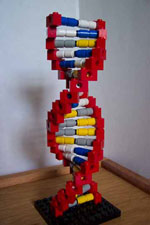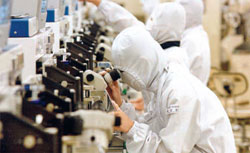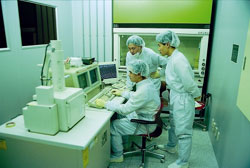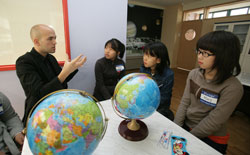The English Test
- Uncategorized
- 2007. 12. 3.

DNA shaped Lego blocks.
At an international molecular biology conference in Shanghai last spring a Korean speaker displayed a slide illustration of a Lego set. He pointed out how the simple pieces of this children's toy could be used to represent amino acids, key building blocks of life. If only something akin to Lego were the language of science.
But that is not the case, English is. So instead of a universal system of pieces (words and phrases) that can be easily joined to build a nearly infinite array of structures (ideas), scientists must converse using a tool that has confusing properties like syntax, semantics, morphology, phonology and grammar. It would not be much of a problem if these linguistic properties were as easy to master as joining Lego pieces, which are engineered to plug together with a precise amount of effort. But again, that is not the case. So with English, as with any language, the native speaker has the advantage.
This can be a problem for non native speakers if proficiency in the language confers professional status. For example, not only must a scientist attain mastery of his discipline but also mastery of English to gain international recognition.
Several years ago, Hwang Kum-ju, a professor of the School of Earth and Environment, The University of Leeds, U.K., made a study of Korean science and technology and the use of English. Interviewing Korean students, doctoral and post-doctoral, in the U.K., he found that many of them felt that the considerable effort devoted to learning English harmed their careers because it takes away from time to do research. And, in addition, Korea might suffer, for as one interviewee said: “We cannot communicate well enough in conferences and international meetings, and this causes national disadvantages.”
In view of the globalization of science and the continuing adoption of English as its language, does English pose an obstacle to Korea's scientific advancement?

The latest data on article publication from the National Science Foundation of the United States show South Korea's output rising from 800 papers in 1988 to 13,700 in 2003. The majority of these articles, however, were not published in the leading (English language) journals, and that still appears to be the case.
For example, Nature reports that out of 685 manuscripts accepted for publication in Nature Materials over the last five years, only nine were from South Korea.
This presents a dilemma for Korean scientists. Most of the students in Hwang's study stated that having papers published in international journals was essential to being a competent scientist or engineer. And Korean universities maintain strict standards of assessment for professors, tied to the number of articles published in international journals. But some of the students said that for Korean scientists, publishing papers in prestigious journals was an uphill crawl because of their deficient English. And their status as non native speakers put them on the periphery of the exchange of information in their discipline.
The Koreans' experience seems to confirm the observation of Neils Bohr, the Danish Nobel Laureate in physics, who saw scientific investigations as not only formal, mathematical undertakings but also informal discussions in which important concepts are explored and understood.
Remarks by a Korean environmental scientist in the Leeds study tell the story well: “It is not easy to publish papers in international journals, because we are not good at English.”

There have been arguments against English as the dominant language in global science communication. Some say that the rules should be relaxed to allow wider use of variants of English that have developed naturally. This might happen over time as the number of non native speakers of English increases. But tomorrow and next week there will be papers that have to be submitted for publication in the English of today.
According to Se-Jung Oh, the dean of Seoul National University's College of Natural Sciences, Korea's total output of published scientific papers is in accord with the nation's economic development. The challenge is to move Korean science up the ladder of recognition. This means increasing its accessibility through the leading international journals.
During the last five years, Seoul doubled spending on scientific research. In a global economy increasingly driven by technology, deriving the maximum benefit from this investment in terms of big-money contracts and partnerships happens only with Korea's full participation in international discussions, meetings and other forms of exchanges. And all require a command of English.

Importance of English education in Korea can never be too emphasized.
In broader terms, language obstacles that Korean scientists and engineers confront reflect past education policy, which failed to meet head-on the importance of English in the advancement of Korean science and technology on the international stage. Ironically, a more serious problem, what Lee Duck-hwan, a professor at Sogang University calls an “unprecedented crisis” could help change the situation.
The crisis is in Korean science education, with, according to Dr. Lee, 60 percent of students in grades 11 and 12 taking no science classes at all. Lee, who holds a Ph.D. in theoretical chemistry from Cornell University and also did post-doctoral work at Princeton, is determined to prevent the science literacy of Korean students, for which they are well known, from decaying. His effort to strengthen the science curriculum is also an opportunity to draw attention to the fact that in today's world and as far as we can see into the future scientific knowledge is a function of communication, and English is the language of choice.
Arnold Stockard is a former editor of the Joongang Ilbo/International Herald Tribune